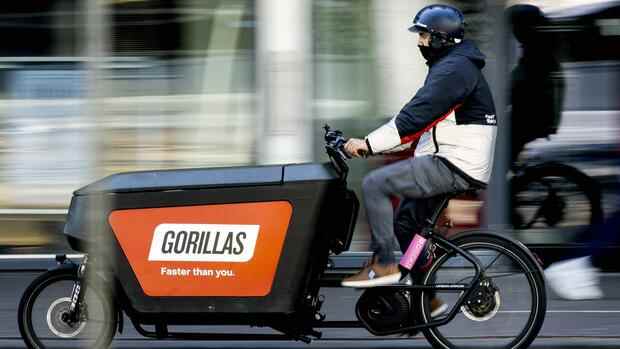The fast delivery service is slowing down expansion in order to get into the black.
(Photo: IMAGO/ANP)
Dusseldorf With its plans to enter the online food retail business in Germany, too, Aldi Süd could set things in motion in German e-commerce. So far, the discounters have had a particularly difficult time here. There is a simple reason for this: no company in Germany has managed to make online food trading profitable.
The biggest challenge is the delivery to the customer, referred to in the industry as the “last mile”. Whether with an army of bicycle couriers, as with the express delivery services Gorillas and Flink, or with refrigerated delivery vans, as with Rewe – logistics are usually the decisive cost factor.
The rapidly increasing willingness of customers, also in Germany, to order groceries online has made it easier for them to make possible profits. And there are some developments and ideas that give providers hope.
Shopping cart amount
One of the decisive factors is the value of the individual order, also known as the “basket size”. Most providers make a big secret out of this value – with good reason, since the shopping baskets are often just 20 euros, especially with the express delivery services in the big cities.
Top jobs of the day
Find the best jobs now and
be notified by email.
If each order is then delivered individually by bicycle messenger, the provider pays extra. This is the conclusion reached by e-commerce expert Matthias Schu from the Lucerne University of Applied Sciences and Arts, who calculated various business models in his “Quick Commerce Report”.
>> Read also: Delivery service Knuspr rushes ahead of the competition
He draws the conclusion that it is only realistic to achieve an operating profit with an average order worth 30 euros and a delivery fee of just under 3 euros.
The Knuspr delivery service, the German subsidiary of the Czech company Rohlik, relies heavily on this factor. The key to profitable operation is a high value of the average shopping basket, said Germany boss Erich Comor to the Handelsblatt: “Our average order is already 80 euros, for many customers the value of an order is already more than 100 euros,” he says .
Automation in the warehouse
The industry also has great hopes for more efficient organization in the warehouses. Technology providers such as Autostore, Ocado and Noyes are promising delivery services that by automating and using robots in the warehouse, they can not only increase speed but also reduce costs.
Rewe, for example, has already automated a large part of the processes in its Scarlet One central warehouse in Cologne. Knuspr also relies on extensive automation in its new warehouses, such as in Hamburg.
delivery efficiency
The Dutch start-up Picnic, on the other hand, is working hard on making the actual delivery more efficient. In order to reduce the cost of delivery for each order, Picnic uses a model it calls the “milkman principle”. Customers are not free to choose the delivery slots, roads are only served on certain days at fixed times.
So far, no retailer in Germany has managed to make e-commerce with food profitable.
(Photo: picture alliance/dpa)
The advantage: Picnic can bundle the deliveries very well and has a high utilization of its electric delivery vans. In exchange for little flexibility in appointment, customers do not have to pay a delivery fee.
In order to further increase the efficiency of the delivery, the routes are calculated by computer algorithms, as with some other start-ups.
According to industry experts, operations in some of Picnic’s delivery areas are already in the black.
Slowed expansion
However, more and more providers are also quite simply reducing the hitherto uninhibited rate of expansion and lowering the costs in order to finally make the business profitable. Fast delivery service Gorillas, for example, has cut 300 jobs and is concentrating on fewer delivery areas.
According to the online supermarket, the average order is worth 80 euros.
(Photo: Knuspr)
He has stopped operations in several countries and closed almost all locations in the Ruhr area.
The Knuspr parent company Rohlik is also reacting. Chief Financial Officer Herman Kopkane has now announced: “We have postponed our start in countries where it is expensive to set up a business, such as Spain, and our expansion in Germany has slowed down.” The start in Hamburg, originally planned for October, will now be postponed to the beginning of next year .
More: Aldi Süd is planning an online offensive in Germany

